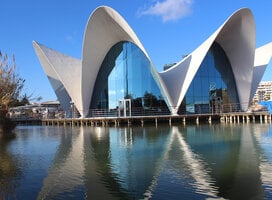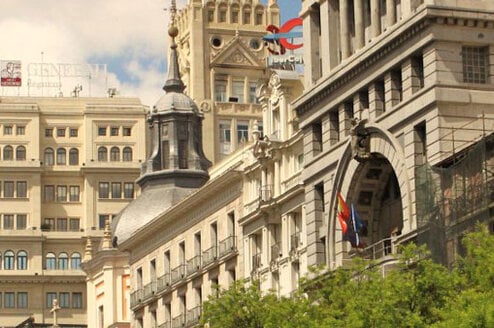Internships in Barcelona, Spain
It is not a coincidence that most tourists visiting Spain choose Barcelona as their primary destination: located on the shores of the Mediterranean Sea, Barcelona is one of the most beautiful and exciting cities in Europe. Capital of one of the richest regions in Spain, Catalonia, Barcelona is home of the oldest Parliament in Europe, world class museums such as the MNAC or the Picasso Museum which has an amazing architecture (included but not limited to the designs of Antoni Gaudí), and, last but not least, prides itself on its soccer team, Futbol Club Barcelona.
Though the economic crisis may seem like a drawback to interning in Barcelona, the contrary stands true. Many companies are looking for new, creative options to thrive in such a difficult time; and they have turned to hiring interns as a viable option. Young people with new ideas are granted responsibility they wouldn’t have been given before. If you are looking for a place to work (and party) hard, Barcelona is for you!
Barcelona is a cosmopolitan city, one of the biggest (and richest) in Southern Europe. The array of internships available is wide and there are possibilities in every sector, from science related fields and technological innovation (the city has a neighborhood devoted only to these types of companies, District 22@) to social sciences and archeology (there are archeological sites in Barcelona dating from 5,000 BC). Some of the most popular fields for international interns to work in are:
Tourism/Hospitality: Barcelona is Spain’s most visited city, with millions of tourists walking around its beautiful streets year-round. Speaking a foreign language is a great asset in this ever-growing industry with really diverse possibilities. Whether you like working outside or would rather stay in the office, this is an industry to consider. Internships include PR positions, planning events, client services, marketing... If you want to meet new people from all over the world this might be the right job for you!
Marketing: Companies operating from Barcelona are diverse and target their products both locally and internationally. These companies value dearly their brand image and that of their products. Interning in this sector can include both working for a specific company or in an independent marketing agency. In both cases interns have the possibility to pitch their ideas and develop valuable skills in writing, design and public relations.
Community Development and Human Rights: As capital of Catalonia, Barcelona is the center of a thriving civil society proud of its organizational capacities and its solidarity. Every year the Catalan National TV runs a “Marathon” to raise money for charitable causes, raising more than 12,387.634 euros last year (16,802.940 USD). Many NGO’s operate from Barcelona, serving Catalan groups (in growing numbers since the recession started) and people in need from around the world. This sector offers the possibility to work in many different areas (immigrants’ rights, LGBT issues, and homeless needs), gaining valuable experience while helping others.
Most internships in Barcelona are unpaid and you will not be expected to work for more than 5 hours a day. Most university students intern in companies related to their field of study in their junior and senior years to gain hands on experience, network, and maybe get permanently hired by the company they intern for. You will be expected to respect a schedule and to fulfill your duties on time, but you won’t be asked any commitment that an average university student wouldn’t be able to take.
When and Where to Look for an Internship
The best time to look for internships in Barcelona greatly depends on the type of business one expects to work in. In most cases though (with the huge exception of tourism), internship opportunities will be scarce during the summer, especially in August, the traditional vacation month in Barcelona. The usual starting dates for internships are September/October both for semester and yearlong internships or January/February for semester long internships. Plan on starting your search a few months before the starting date to make sure you get to choose exactly the type of internship you want, since the better considered internships fill up fast.
There is the possibility of looking for internships through online sites and forums, but if you have never been to Barcelona before and you are not fluent in Spanish it may be a good option to consider using an internship placement agency. These agencies will help you through the visa process, which is always lengthy and challenging if you don’t know exactly how to deal with Spanish bureaucracy.
Cost of Living in Barcelona
The cost of living in Barcelona is cheaper than in other important European cities such as Paris or Berlin, but take into consideration that it is one of the most expensive cities in Spain. If you are frugal you should be able to live on a budget of around 900-1,200 euros (1,220-1,627 USD), especially if you find inexpensive housing. You may be able to find good deals to live in the city center for around 400 euros a month (542 USD) if you don’t mind living in a small apartment or sharing it with other people (University boards are a good place to find good offers to share an apartment).
The further away you go from the city center the less expensive the housing will be. You may even consider living in one of the surrounding cities –L’Hospitalet, Badalona, Santa Coloma – since the public transportation is really good and it shouldn’t take more than half an hour to get from most of these places to the smack dab of Barcelona. Another good way to safe is to buy in the “mercats” traditional markets located in almost every neighborhood in Barcelona. Mercats’ prices are cheaper than in big malls.
If you need some extra money to make ends meet, or just because you want to have some fun, giving private English classes under the table is a great option. The rates vary from 14 to 25 euros and hour (19 to 34 USD) depending on your experience and certifications. You can target a wide array of clients, from high school and University students to professionals who want to increase their career possibilities. You will also have other possibilities to work under the table, but be careful since it is an illegal practice and it is easy for dishonest employers to avoid paying you once the work is done.
Work Culture in Barcelona
Etiquette: Catalan people are usually welcoming to strangers and will treat you warmly. Don’t be surprised if they ask you a lot of personal questions, it is their way of showing their interest and care. When being introduced to new colleagues, expect some small talk and, if you are a girl, it is likely that you will be given (and expected to give at the same time) a kiss on each cheek, the traditional way of greeting someone for the first time (it is also common between friends to greet themselves like that every time they meet). If you are a male, your female co-workers will greet you with two kisses, but your male colleagues will shake hands with you. This is the traditional way of greeting someone, but once you’ve met all your co-workers a “Hola” or “Bon dia” when arriving to work will be enough.
Though Catalan people are known for their hard-work ethic, they value greatly a warm work environment so you’ll probably see that people interact a lot, engaging in small talk and jokes, even some bantering, which is a sign of appreciation. Try to take part on these chats and don’t miss any lunch or dinner to which you are invited, since this is an important way for Catalan people to bond. If someone suggests getting a cup of coffee, they are showing their interest to get to know you better. Always remain humble and don’t try to advance without considering your co-workers: being proud and too individualistic is considered a great offense in Barcelona and Catalonia in general.
The attire in most businesses is casual and you will be able to dress as if you were going to school. If that is not the case you will be told otherwise, and a white shirt and a pair of jeans should suffice for most business-casual events. Pay attention to what your co-workers wear and try to dress similarly.
Language: Though more and more people in Barcelona are starting to learn English, it is still difficult to find fluent English speakers outside of the more touristic outlets. Most people will do their best to understand you, but a good command of Spanish is of great importance if you want to be able to hang out with locals.
Though everyone speaks Spanish, the national language of Barcelona (and all Catalonia, together with Valencia, the Balearic Islands and a part of Southern France) is Catalan. Catalan people value their language greatly and consider it the expression of their particular history and culture. It will be greatly appreciated if you learn a few sentences in Catalan: for them it will be the ultimate proof that you are trying to integrate and they will treat you even better. As you might have heard, there is a huge secessionist movement in Catalonia.
Try to be understanding with those who want to secede from Spain as well as with those who don’t, and be careful when calling someone “Spanish” or a “Spaniard” in Barcelona – it may be considered a great offense for those who want to gain their independence from Spain and only identify themselves as Catalan.
Networking: The best way to network in Barcelona is to establish a good relationship with your co-workers. Loyalty and modesty are greatly valued in work environments. If you make your co-workers trust and appreciate you, they will help you understand how the business works and meet people that might help you push through. Usually these kinds of connections take place in informal lunches and dinners, so try not to miss any. Barcelona is also home of the “Fira”, a trade fair that organizes exhibits and congresses for professionals of different sectors, some of which are the most important in the world, such as the Mobile World Congress, the urban fashion show The Brandery or the biannual construction fair Construmat. If there is a fair related to your field, don’t miss it!
Work and Labor Laws in Barcelona
Most internships in Spain are unpaid, so either if you entered the country with a tourist or a student visa, that is how you’ll be considered officially. Catalonia has a great public health system available to everyone so even if you don’t work you can use it and feel safe on that matter (if you have one, check with your private insurance broker to avoid undesired charges). If you want to find a job with a salary you will need a work permit, which will be difficult to get. Spanish companies usually avoid sponsoring international visas due to the great amount of bureaucracy it implies. Though you can apply for an internship on your own, Spanish bureaucracy is slow and difficult to deal with; if you’re interested in a paid internship, you might seriously consider contacting a job/internship placement agency.
Contributed by Maria Pomés Lorencés
Internship Programs in Barcelona
Pagination
What People Are Saying
New Internship Placements
View the latest intern placement postings on our job board.
Related Internships Abroad Articles
Frequently Asked Questions
-
Is it expensive to live in Spain?
While larger cities like Madrid and Barcelona can be on the more expensive side, the cost of living in Spain is lower than in most European countries. A room in a shared apartment in a city center like Madrid can range from about €350-€600 ($390 - $672 USD).
-
Is it safe to live in Spain?
Spain is a very safe country. But, just like the rest of Europe, Spain is notorious for pickpockets. It's important to not carry your passport around and always keep an eye on your phone!


















